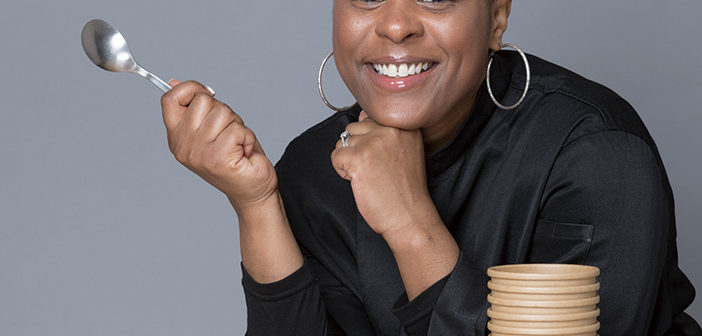Having launched a successful artisan food product, which goes by the name of Halo Hummus (some of you may have tried it), I was asked by beijingkids to share the toils and triumphs of brand building in Beijing. Throughout the rapid growth of Halo Hummus, the number one question people ask me is, how did you do it? But ultimately the conversation turns to all the unanswered questions those seeking to start a business have in this bustling self-starter city.
If you are trying or thinking about creating your own startup you may have several questions you need desperate answers to: how do you navigate yourself through the Beijing Business Maze of rules and regulations? How do you find support and advice? How and where should you network? If you’re not feeling overwhelmed by these, you might be by other questions!
Look no further. There is light at the end of the business tunnel, and Beijing has a thriving small business community to glean from; and speaking of gleaning, that’s exactly where you should start!
So, you have an awesome product or idea, your close friends and family love it, and perhaps others have purchased from you, whether it be a product or service. If these purchases have been in quantities that signal you’re on to a winner, it’s time to seek out others who have been where you are and have successfully scaled up their startup. Reach out and learn from the best.
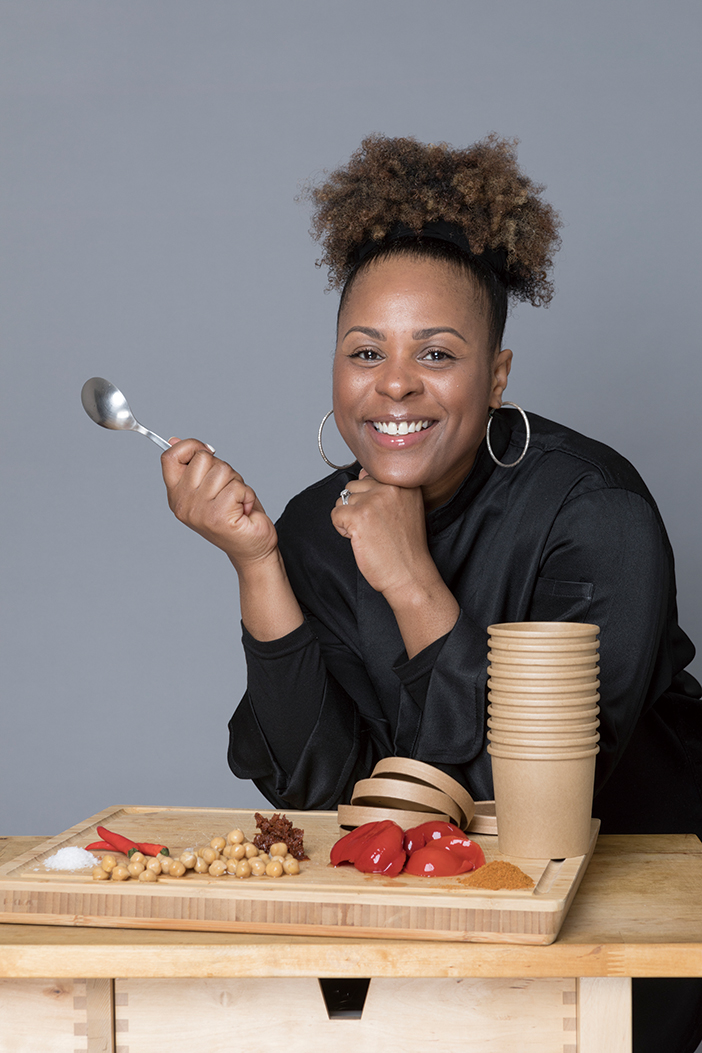
Before officially launching Halo Hummus, I took my product to a well-known and frequented makers market. Rumble in the Jumble at Modernista is described as “a Hutong market of epic proportions,” and indeed it was. I made eighty tubs of hummus in a variety of flavors and toppings, and sold all but fifteen. The remaining tubs were bought the following morning in a WeChat group created on the day of the market. I had no branding or following, and simply made something of quality, filled brown cups with it and off I went. I had no standing in the entrepreneurial community, I belonged to no ‘makers’ groups and my business acumen was zilch.
Despite this, I walked away from the event inspired. How did I know I was onto a winner? My product was liked, my product sold, my product made a profit, but where to go from there? I knew I had something that potentially had mass appeal. It was time to go on the hunt for fantastic entrepreneurs and their fountains of knowledge.
Participating in the Rumble in the Jumble market gave me access to a community that otherwise would have remained in complete obscurity to me. I had been a vendor that day and had earned an add to a number of thriving Wechat communities, including the Rumble in the Jumble vendors group, Bakers, Makers, Movers and Shakers, and the Bazaar & Markets Network.
A number of entrepreneurs are creating, building and managing growing artisanal brands. From baked goods to lotions and potions, quality homemade items are never far from reach, and in these groups I found numerous examples of successful startups. I was able to chat over brunch with one of the nutty ladies who make up half of the Naked Nut Butters duo and brand. We talked about business longevity, licensing, branding, and more.
Its important to seek out and learn all you can from someone who is where you want to be. In this meeting, it was confirmed that you need to network, have grit, sheer tenacity, belief and, of course a good if not excellent product or service.
I went home that day and did what all serious wannabe entrepreneurs should do: research, research, research. Now was the time to get familiar with my product, its history, and my vision for my brand. At the time Halo Hummus was unrecognizable. Who and what was Halo Hummus? How would I go about growing my customer base? How could I ensure that my product stood out and be recognized? How could one reach out to me? How could one order?
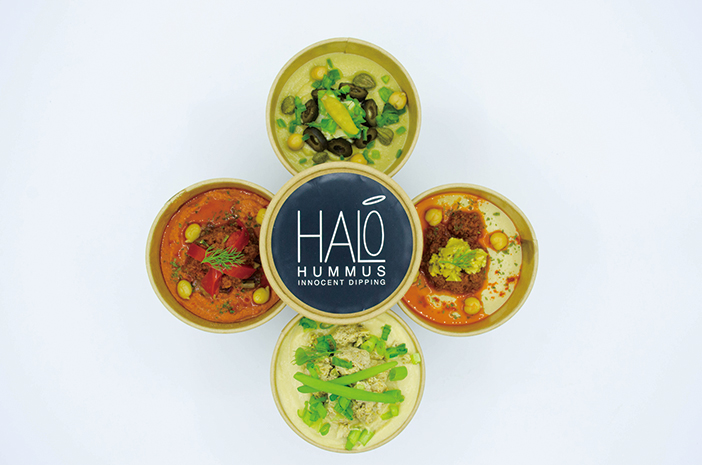
A vision statement sounds cliché and overspun, however it really will become the backbone of your business and the foundation upon which to build. In fact, no one needs to see it or read it (unless you get to the stage where you are ready to write a business plan for investors), but it will guide you, so write it down and keep it somewhere in plain sight or to hand.
To become recognizable was next in line. What did I want my brand to look like? I kept a notepad on my bedside table and bought a chalkboard and easel for my kitchen and sketched! I sketched down what I envisioned my logo and other branding items to look like. I went for a minimalistic, black and white stacked logo, asked a graphic designer to put it together for me, sent it to the printers and hey presto, potential and existing customers could now recognize Halo Hummus as a brand.
You don’t need to break the bank, and if you have talented friends and family, this item and many others you can try and swing at getting for free! Drawing on your own strengths in other areas can also save your new startup’s precious Renminbi. I drew on my strengths as a journalist and presented who and what Halo Hummus was using stylized promotional material; slotted them into acrylic stands and went about growing my customer base – I hit the markets!
I created Halo Hummus in October of 2017 and took advantage of the Christmas season and all its glorious festivities. Reach out to community organizers, schools, events, and functions. Shout about your awesome product and why you should be featured as a vendor. Most markets charge a reasonably affordable table fee, and provide you with incidentals and more importantly a considerable footfall of new customers.
Print out your Wechat QR code, have a table cloth printed with your logo, write a ‘My Story’ blurb and have it visible. Get customers buying and scanning, and create a Wechat group so people who want more of what you’re selling can contact you and place an order. Enjoy the buzz around your new hobby-turned-business as I did, and prepare to work hard.
What came next was an exhausting but thrilling winter season, filled with the joys of 4am wake-up calls, six to eight hours of blending in a four-by-four kitchen twice to three times a week, the filling of up to one hundred pots of hummus in a single evening, plus carefully (and obsessively) placing toppings. But this is what it will take: your blood, sweat and tears. Prepare for your home to turn into the manufacturing base for your product, and try and laugh your way through it or you will cry.
There are no such things as sweatless victories. You will need to put in the hours and often while juggling a full time job, possibly raising children, looking after the home, and having a social life (maybe make peace with not having a social life for a while). But the results will be worth it.
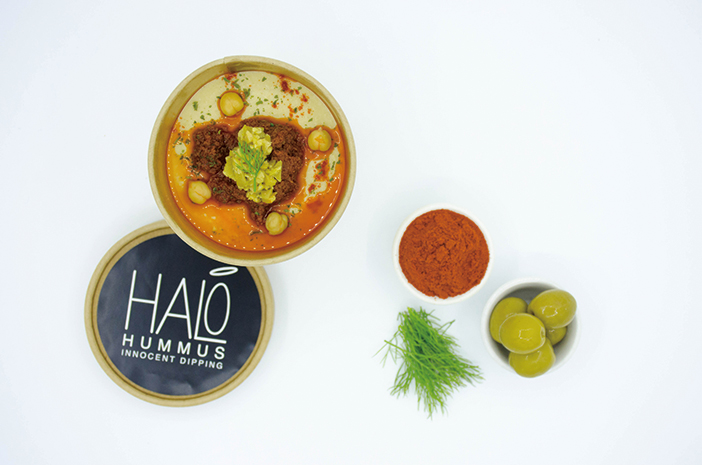
As my business grew it was becoming near impossible to produce from home. I was offering deliveries two to three times a week, and trying to manage at least twice weekly wholesale deliveries of chickpeas and other goods. It was time to look into production space and obtaining a business license. This journey is different for everyone; however a growing startup business in Beijing requires looking into the legalities of running a business in China.
It’s important that while growing your startup, you connect and network with local businesses that can offer production space for a fee. Look into the ways that local businesses can help you while you start the process of obtaining your own license. They will be able to connect you with agents who can brief you on what capital and documents you will need.
Be prepared. Obtaining a business license takes up to a year, and it’s always good to take advantage of presentations and events that offer advice, support and knowhow on startup formation, structure and licensing processes, such as the ones offered by Cultural Keys.
The most common type of business setup entity for mainland China-based businesses, where individuals or corporations can incorporate a 100 percent foreign-owned limited liability company is a WFOE: Wholly Foreign-Owned Enterprise. The one time fee for a WFOE set up, including service and consulting, will set you back roughly RMB 16,000. An agent will usually deal with your application and there are several other fees attached to the process, depending on your needs.
Remember that the road to scaling up your business through partnership, new ventures and cross-platform agreements are not always paved with gold. Research, ask questions, and collect financial data throughout the development of your business, so you know what are feasible paths for growth. Bumps and hurdles will and always do occur, but treat them as learning opportunities. You come out stronger and more knowledgeable. It’s OK to make mistakes; in fact, it’s an integral part of becoming a good businessperson.
I chose to hire kitchen space with a place of business that offered incubator services as part of the package. However, there were a lot of aspects of scaling up a business that I did not account for. Every challenge will be unique to your particular product and with mine being a freshly prepared, made-to-order consumable, I had little knowledge of how to translate and transition my domestic production line into a fully operational assembly for mass orders.
I needed not just kitchen space; I needed trained staff, an operational manager, and more. In short I had built my business to a point where for it to function and continue to grow, I needed investment. I have achieved more on my own than one usually can with a startup in little over nine months. However with my kind of growth comes the need to eventually invest substantial capital – if I wanted to take my product out of my domestic kitchen and into the big wide food industry, I would need money and lots of it, and so will every startup at some point on its journey.
My bump in the road was my lack of knowledge and preparation before venturing into unknown territory, and then came a literal bump. Eight weeks before a scheduled move into kitchen space, I found out I was pregnant! I continued production of Halo Hummus eight months into pregnancy in order to avoid sidestepping the hummus dream. The truth is, sometimes you have no choice but to adapt to changing circumstances. Adapting for me meant scaling back, looking after the new love in my life and offering a limited Halo Hummus service from home.
If you’re still at the idea phase of your business, before you can start to glean from others or design your brand, there is no better advice than to – if I may borrow for a moment the aspirational phrase of one of our favorite conglomerates – Just Do It! The right time is always now. Think of the beginning as not an obstacle course (though there will be challenges), but as a corridor of open doors. Some will lead to your desired destination while others will require you to go back on yourself until you find the right ones to walk through. Remember, you must have a vision to partner your idea, and the building blocks of a brand.
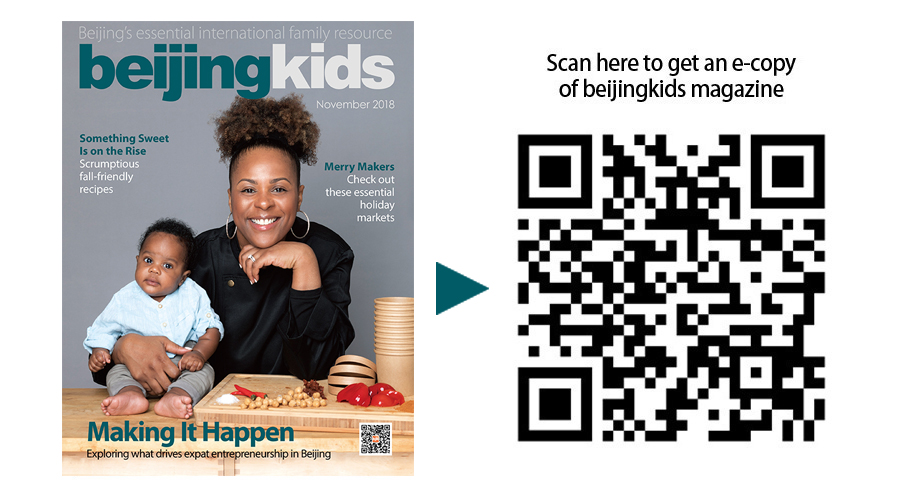
This article appeared in the beijingkids November 2018 Beijing Makers issue
Photo: Fang Yifei, Nicole Bonnah

